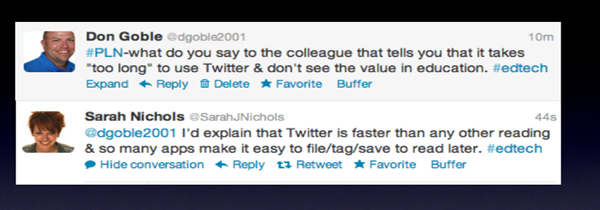Scholastic Journalism Call for Help on Social Media Use
 Social media has become a piece in the fabric of our lives, including the professional world of journalism. Many teachers across the country are beginning to incorporate social media lessons and practices in their classroom, and in my opinion, for good reason. We need to stay on top of the fast-paced, ever changing technologies to report the news and promote our publications.
Social media has become a piece in the fabric of our lives, including the professional world of journalism. Many teachers across the country are beginning to incorporate social media lessons and practices in their classroom, and in my opinion, for good reason. We need to stay on top of the fast-paced, ever changing technologies to report the news and promote our publications.
However, there are many media teachers who are especially concerned with the time it would take to get involved with a Twitter or Facebook account. There are fears of problems, issues, misuse, or a negative community perception. And quite frankly, I’m hearing from broadcast and journalism teachers that they don’t see the overall value for social media in the classroom.
Here is my call for help from YOU, the scholastic journalism gurus across America. I need your input, advice and value statements to help convince others on the merits of teaching our future journalists these skills.
Tell me a story, send in links to thought-provoking articles, or simply state your case why YOU think we must be teaching appropriate social media skills to our students, especially in a journalism world.
The comments section below is a blank canvas ready to be painted.
I’m all ears……




To me, this is more of an issue of the teacher refusing to learn something new that will help them teach responsible use of social media to their students. All too often we fear what we don’t know, and sometimes we convince ourselves that we are too “busy” to learn a new skill. In reality, we’re scared that the kids know more than we do and in teaching it a student may call us out on something.
However, the fact cannot be ignored that Twitter is the #1 source for online news today. Twitter, Facebook, Youtube, any social media outlet is part of journalism’s future. I would mention this to your colleagues and say that if we are not teaching to our present and future we will be stuck in the past (yes, cliche, I know…).
We have to teach standards on all the platforms people use. Journalism (that is: true, accurate reporting of facts, situations, and interactions) is still happening on paper, and it is still happening via traditional media platforms and businesses, but it is also happening on an individual level in a new way. Individuals have been at the forefront of communications in the past, but we have added a technological dimension to communication that allows individuals to be heard. That is what is happening in social media: individuals are speaking and finding audiences. If we don’t teach this media, then we can’t expect to have standards put into place in this media. It is vital to teach it.
Excellent discussion points Mary and Brad. Thanks for sharing your thoughts!
One of the things I’ve learned is that there will be a conversation going online regardless of whether or not you are there. If you are there (and by you I mean you personally or your staff) you can help control the message a bit. You can’t control what others say, but you have all the control over what kind of message you put out there.
Not to be long-winded, but:
I understand boundary issues within some school districts – my district has a very clear social media policy that prevents students from maintaining an online presence as owner and able to post live for school production staffs. In addition, I am not to have private (and probably public) communications with them via facebook pages or such because of the fear of improper use. I understand this, maintain an education on the pitfalls of online usage and keep a clear line.
However, it is still a necessary tool for communication and can work to every teacher’s advantage. Sometimes it serves as a mere reminder in the format they communicate in, (lets be honest an email is not going to reach them and receive a response like a text message or facebook post or even a tweet. Email is their version of snail mail.) And sometimes, it serves as a way to enrich the curriculum by a teacher’s ability to curate and share websites that can be useful for preparing a production staff (my yearbook staff would still be in the planning stages if it were not for pinterest, which is really a visual twitter.) I am not allowed to follow them on twitter, friend them on facebook, or communicate with them one-on-one outside my school email, but I am allowed to share, develop and grow a staff of technologically savvy kids that understand the basic dynamic of online tools and how to utilize them not just for entertainment, but for benefit of clear, correct and useful communication.
If you were to evaluate the basis of all classes – we (the teachers) are educating students on proper formats of communication. Science explores how to communicate through lab reports, math explores how equations can communicate and solve problems, English communicates in persuasive and narrative lanaguage, while journalism seeks to communicate free of bias what is news, curating the communication channels in the multiple courses within the journalism spectrum.
If you cannot value the way they (the students) communicate, how can you ask them to value the way we are trying to educate them? In the end, you cannot turn a blind eye to what they are already doing, instead you must teach them how to utilize the toy to make it a tool, which is the basic building block of all education.
One time someone explained social media skills by comparing it to typing. The point was that keyboard typing used to be a specialized skill. People were trained to type, and that is what they did for a job. Now typing is a skill people are expected to have. Social media is a skill for people now and something that people may specialize in, but eventually it is going to be an expectation. People will be expected to know how to communicate through it, and how to be responsible and effective in those communications.
With journalism changing, there is no longer a single specialty that a reporter can focus on. Now reporters are expected to write, take a photo, post the story online, and get the story out to the public. I don’t think these expectations are necessarily from news organizations, but from the public. As a society, we want to know what is happening when it happens not a day later. The more skills and knowledge a journalist has, the more marketable they will be when applying for jobs.
Social Media is more like distribution.
Websites (articles, links, et al) are measured by page views and back links. Applications measure websites activity. The information is not secret, even if the exact Google PageRank might be secret.
We can plug in our JEA.org website (our jeadigitalmedia.org site) and other sites and see where our sites rank in popularity.
Our numbers are low. It is one thing to be driven by awards and another to disregard distribution.
bf
Great dialogue from all the comments. These are extremely poignant, and will ultimately be very helpful.
SOCIAL MEDIA is the here and now–and the future. The fact that schools are ignoring this opportunity to teach students how to use it responsibly. It’s a disgrace, really. Every high school student should be required to take a course in social media and responsible use, not just journalists.
Why WOULDN’T you want to use social media? I know that there are school boards and principals that are scared of this uncharted territory, but the law is on the students’ side. Check out this article from the Student Press Law Center which reviews a case from earlier this year upholding the rights of student’s off-campus speech (i.e. their own social media accounts) http://www.splc.org/wordpress/?p=3089
In order for us to teach proper digital citizenship, the students must be free to practice this good behavior, and teachers must be free to model good behavior.
The best argument is that this is what the professionals are doing. We always talk about “professionalism” with our students and when we develop our curriculum, so social media should be part of that curriculum.
Take a look at how my students use Facebook:
http://www.facebook.com/mustangmorningnews
And Twitter:
@miracostanews
I very much agree here that social media should be a class offered to all high school students and not just journalism programs. Schools can’t keep ignoring the fact that social media is a main mode of communication for most people. Plus, most schools have Facebook pages or Twitter accounts to update parents and students, yet the sites are blocked during the school day.